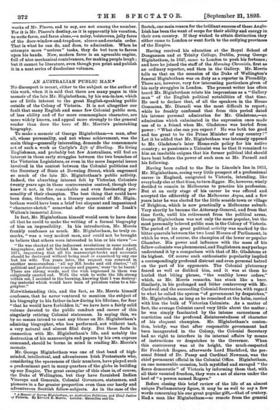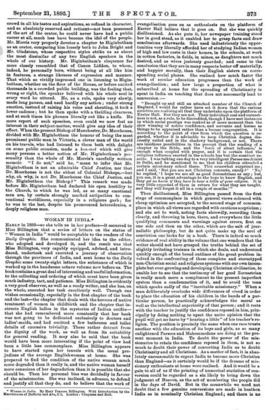AN AUSTRALIAN PUBLIC MAN.* No disrespect is meant, either to
the subject or the author of this work, when it is said that there are many pages in this memoir of the late Mr. Higinbotham, by his son-in-law, which are of little interest to the great English-speaking public outside of the Colony of Victoria. It is not altogether our fault that many English and some few Colonial public men, of less ability and of far more commonplace character, are more widely known, and appeal more strongly to the general reader than does the hero of Mr. Morris's painstaking biography.
To make a memoir of George Higinbotham—a man, after all, whose personality, and not whose achievement, was the main thing—generally interesting, demands the consummate art of such a work as Carlyle's Life of Sterling. No living En glishtnan, and probably but few Australians, will feel an interest in those early struggles between the two branches of the Victorian Legislature, or even in the more Imperial issues involved in the contest between the Colonial politician and -the Secretary of State at Downing Street, which engrossed so much of the late Mr. Higinbotham's public activity. Indeed, the absorbing interest felt by Victorian Colonists twenty years ago in these controversies centred, though they knew it not, in the remarkable and even fascinating per. aonality of their champion. The best thing that could have been done, therefore, as a literary memorial of Mr. Higin- botham would have been a brief but eloquent and impassioned ' character-sketch" somewhat after the manner of Izaak's Walton's immortal Lives.
In fact, Mr. Higinbotham himself would seem to have done all that he could to make the writing of a formal biography -of him an impossibility. In his introduction, Mr. Morris frankly confesses as much. Mr. Higinbotham, he truly re- marks, "was a very modest man, and could not be brought to believe that others were interested in him or his views ":— " He was shocked at the indiscreet revelations in some modern biographies, and left behind him a memorandum dated April, 1874, requesting that all his manuscript-books and accounts should be destroyed without being read or examined by any one but his wife. Ten years later, the request was renewed in another memorandum : all my MS. books and old diaries,' 'all political and professional remains and papers,' were 'to be burnt.' These are strong words, and the wish expressed in them was religiously carried out. With the wish to write the life strong within me, I assisted in the burning, knowing that I was destroy- ing material which would have been of priceless value to a bio- grapher."
Notwithstanding this, and the fact, as Mr. Morris himself -confesses, that he never ventured to mention the subject of his biography to his father-in-law during his lifetime, for fear "that he would have forbidden it," we have here a fairly solid volume devoted to the public conduct and career of this -singularly retiring Colonial statesman. In saying this, we by no means intend to cast any blame on Mr. Higinbotham's admiring biographer, who has performed, not without tact, a very natural and almost filial duty. Bat these facts in connection with Mr. Higinbotham's life, and notably the destruction of his manuscripts and papers by his own express -command, should be borne in mind in reading Mr. Morris's memoir.
Mr. George Higinbotham was one of that band of high- minded, intellectual, and adventurous Irish Protestants who, considering the sparseness of their numbers, have played such a predominant part in many quarters of the globe in building up our Empire. The great exemplar of this class is, of course, the Duke of Wellington, but they have furnished Indian Viceroys and Generals, Colonial Governors, statesmen, and pioneers in a far greater proportion even than our hardy and -adventurous Scottish fellow-subjects. As in the case of the • A MrinOir of George Ifiginbotham, an Australian Politician and Chief Justice of Victoria. By Edward E. Morris. London: Macraillan and (30.
Scotch, one main reason for the brilliant success of these Anglo- Irish has been the want of scope for their ability and energy in their own country. If they wished to attain distinction they either came to London or went forth to the outlying provinces of the Empire.
Having received his education at the Royal School of Dungannon and at Trinity College, Dublin, young George Higinbotham, in 1847, came to London to push his fortunes; and here he joined the staff of the Morning Chronicle, first as an ordinary reporter, and then in the Gallery. Mr. Morris tells us that on the occasion of the Duke of Wellington's funeral Higinbotham was on duty as a reporter in Piccadilly. There are, however, very few interesting particulars given of his early struggles in London. The present writer has often heard Mr. Higinbotham relate his impressions as a "Gallery man" of the English political notabilities of that time. He used to declare that, of all the speakers in the House Commons, Mr. Disraeli was the most difficult to report; while he frankly confessed that from this period dated his intense personal admiration for Mr. Gladstone,—an admiration which culminated in the expression once made use of to a friend when Mr. Gladstone was hurled from power : "What else can you expect ? He was both too good and too great to be the Prime Minister of any country !" Let it be added that Mr. Higinbotham was intensely opposed to Mr. Gladstone's later Home-rule policy for his native country ; so passionate a Unionist was he that it remained to him an insoluble enigma that his former political idol should have bent before the power of such men as Mr. Parnell and his following.
Having been called to the Bar in Lincoln's Inn in 1853, Mr. Higinbotham, seeing very little prospect of a professional career in England, emigrated to Victoria, intending, like everybody else at that time, to turn digger. He, however, wisely decided to remain in Melbourne to practice his profession. But at an early stage of his career he was offered and accepted the editorship of the Melbourne Argus, and a few years later he was elected for the little seaside town or village of Brighton, which is now practically a Melbourne suburb. Very shortly he became the Attorney-General, and from that time forth, until his retirement from the political arena, George Higinbotham was not only the most popular, but the most personally beloved public man in the Colony of Victoria. The period of his great political activity was marked by the bitter quarrels between the two local Houses of Parliament, in which he was, of course, the champion of the lower or popular Chamber. His power and influence with the mass of his fellow-colonists was phenomenal, and Englishmen may perhaps understand it by a comparison with that of Mr. Gladstone at its highest. Of course such enthusiastic popularity implied a correspondingly profound distrust and even personal hatred on the part of his opponents. The Colonial plutocracy feared as well as disliked him, and it was at them he hurled that biting phrase, "the wealthy lower orders," which, as Mr. Morris remarks, has stuck like a burr. Similarly, in his prolonged and bitter controversy with Mr. Cardwell and the succeeding Colonial Secretaries, with regard to what he called the system "of government by despatches," Mr. Higinbotham, as long as he remained at the helm, carried with him the balk of Victorian Colonists. As a matter of fact, the average Colonist cared very little about the matter ; he was simply fascinated by the intense earnestness of conviction and the profound disinterestedness of character of his eloquent champion. Mr. Higinbotham's conten- tion, briefly, was that after responsible government had been inaugurated in the Colony, the Colonial Secretary had no right to interfere in its internal affairs by means of instructions or despatches to the Governor. When this controversy was at its height, the much-respected Sir Frederick Rogers, afterwards Lord Blachford, the per- sonal friend of Dr. Pusey and Cardinal Newman, was the chief permanent official in the Colonial Office. Higinbotham, on one memorable occasion, both mystified and enraged "the fierce democratie" of Victoria by informing them that, with all their vaunted freedom, they were a set of slaves under the heel of "a person named Rogers."
Before closing this brief review of the life of an almost unique Parliamentary figure, it may be as well to say a few words concerning his one great popular gift,—that of oratory. Had a man like Higinbotham—so remote from the general crowd in all his tastes and aspirations, so refined in character, and so absolutely reserved and reticent—not been possessed of the art of the orator, he could never have had a public career at all, much less have become the idol of the people. Mr. Morris very properly devotes a chapter to Higinbotham as an orator, comparing him loosely both to John Bright and Mr. Gladstone, whose respective styles strike ne as about the most dissimilar of any two English speakers in the whole of our history. Mr. Higinbotham's eloquence far more closely resembled that of Canon Liddon, to whom, indeed, he personally bore, without being at all like him in features, a strange likeness of expression and manner. That which so vividly impressed one in listening to Higin- botham, whether on the floor of the House, or before excited thousands in a crowded public building, was the feeling that, wrong or right, the speaker believed with his whole soul in every word he uttered. He, as a rule, spoke very slowly, made long pauses, and used hardly any action ; under strong emotion, instead of raising his voice and shouting, it took a lower cadence ; bat he then spoke with a thrilling clearness, and at such times his phrases literally cut like a knife. No mere report of such speeches, even could we now feel an interest in their subject-matter, would give any idea of their effect. When the present Bishop of Manchester, Dr. Moorhouse, divided with Mr. Higinbotham the honour of being the most prominent public man in Victoria, a clever man of the world on his travels, who had listened to them both with delight on some public occasion, made a bon-mot which will give many persons a better notion of Mr. Higinbotham's per- sonality than the whole of Mr. Morris's carefully written memoir. "I do not," said he, "mean to infer that Mr. Higinbotham is not an admirable Chief Justice, nor that Dr. Moorhouse is not the ablest of Colonial Bishops,—but why, oh why, is not Dr. Moorhouse the Chief Justice, and Mr. Higinbotham the Bishop ? " This remark was made before Mr. Higinbotham had declared his open hostility to the Church, to which he was led, as so many emotional men are, by certain strongly marked antipathies to con- ventional worldliness, especially in a religious garb ; for he was to the last, despite his pronounced heterodoxies, a deeply religious man.



































 Previous page
Previous page